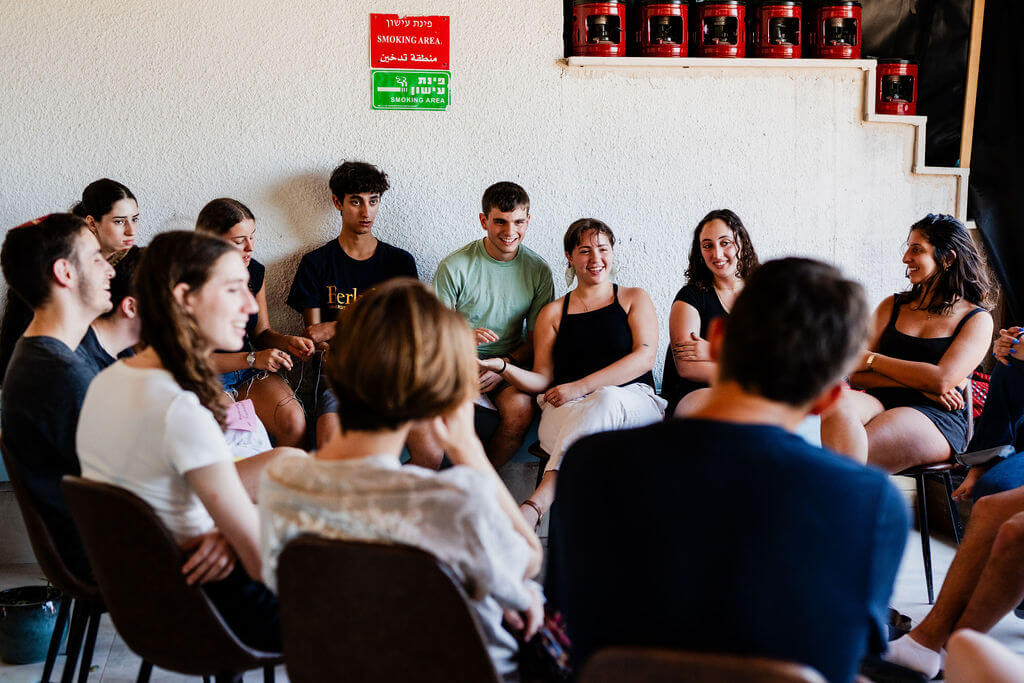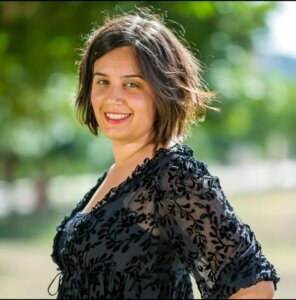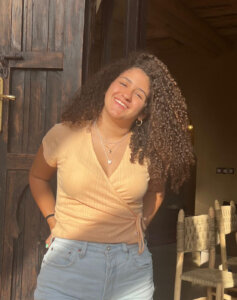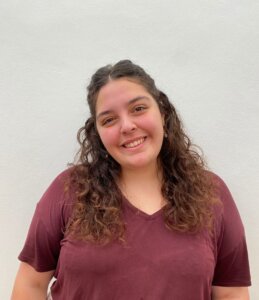‘How can we ever go back to being anything like we were before?’
With every aspect of life affected, Israelis describe the emotional magnitude of life during wartime

Graphic by Angelie Zaslavsky
Editor’s note: The Bronfman Fellowship is an educational program for Jewish high school students from North America and Israel. This is our third installment of pieces showcasing the experience of some of Bronfman’s Israeli fellows and alumni since the Oct. 7 terror attack.
‘There’s no more security, not even inside my house’
TEL AVIV — If you ask me how I am now, I’ll answer “fine” in an optimistic manner, quietly and tersely, and I’ll pull my shoulders up.
But the truth is that nothing is fine. For a month now, I’ve been raising my son Kedem alone, because my partner is on the border with Lebanon. War is taking place there now, also.

Between moments of anxiety and fear about my partner (and my brother-in-law, my cousin, my husband’s nephew and many others who are situated on the front lines for whom I constantly worry), the national mourning also bursts out; it’s omnipresent. There are days when the mourning is so heavy that it’s impossible to breathe. The air is physically so dense and tough that it’s impossible to expand the lungs to take a breath, not even a small one. How can we ever go back to being anything like we were before that terrible Shabbat?
A week and a half ago, my close friend was notified that his father-in-law and mother-in-law’s bodies were identified among the killed in Kfar Aza. Yes, you’re reading that correctly: It took more than two-and-a-half weeks to locate and identify their bodies. And yes, there are still tens of bodies that have not yet been identified. When I went to offer condolences to my friend and his wife on their personal loss, I couldn’t find any words of comfort. Because I myself don’t find any points of hope or light amidst the great darkness. I am not fine.
There are certain moments when I succeed in laughing and smiling, mostly thanks to my child who still doesn’t understand anything but manages to light up my world. But then I look at him and understand that he is not yet two years old and it has been a month since he has seen his father. Not to mention that he doesn’t sleep in his bed or play with his friends, because we relocated to live with my parents since that Shabbat. And then I remember that it’s nothing and inconsequential. It’s nonsense. We’re alive, and that’s what’s important! Everything else shrinks and disappears in comparison. But again, there’s no air. It’s impossible to breathe.
The hardest thing to recognize is that our lives will never be the same again. Everything changed, forever. There’s no more security, not even inside my house. The only thing I can think about is how I would block the door if terrorists tried to burst in. And that’s only the tip of the iceberg of the new fears that have grown inside me since that dark Shabbat.
We’ve been at war for a month already and we don’t know how long it will continue, the other costs it will exact from us, or how we’ll come out on the other side. I remember in the first week, I thought to myself that certainly, my partner will return by Kedem’s birthday in January and we’ll celebrate it together. We will throw a big, festive party. Yet I’m suddenly uncertain what will happen.
Nothing is fine, and it’s impossible to breathe. And what of the young children who were kidnapped? No, no, I must not think of them. That’s a danger zone. There, it’s not just that there isn’t air — there, I can’t sleep, eat, or function at all.
This is my life. I don’t know if it will ever look different. I can only hope that once again I’ll be able to feel the faith I had before, that there can be good here.
— Tamar Shalem, 30
‘I can call it a routine, but it’s not a real one.’

PARDES HANNA-KARKUR, Israel — When everything started, I was on a trip to Morocco with my family. We were supposed to finish the trip in Marrakech to visit my great-grandmother’s grave, as well as the Jewish neighborhood where my grandparents grew up.
On the morning of Oct. 7, we had planned to wake up to see the sunrise in the Sahara Desert, but instead we awoke to chat notifications from family and friends at home. I had difficulty understanding and believing what was going on because of the contrast and the distance — on the one hand, I was opposite a breathtaking view of the sunrise, while at the same time my country was undergoing one of the most destabilizing and difficult events in our history. We quickly decided to leave Morocco for Barcelona and from there we were able to get on an earlier flight home to Israel.
As soon as we got home, we began to truly feel the war. Some of my family members went to fulfill their reserve duties and other family and friends evacuated from their homes in the Gaza Envelope, from Sderot, and from the North.
I remember our first day home as a day when the house was full. Friends who wanted to be together during this time, family members who didn’t have a shelter in their home or who wanted to go somewhere quiet for a moment, away from the places filled with sirens — everyone came to us.
Since the start of the war, I’ve participated in all kinds of volunteering. I teach children who need extra help, I participate in agricultural activity, and I’ve done other small volunteer activities. In my region in the Haifa District we’ve already returned to a kind of routine, albeit a fabricated one. We go to school but not for the whole week. Every day begins with instructions about how to conduct ourselves during dangerous situations. I can call it a routine, but it’s not a real one.
— Naama Benmocha, 17
‘There are children who do not even have a home to return to’
TEL AVIV — I spent Oct. 6 at my pre-military preparatory program, the secular yeshiva Bina, in south Tel Aviv. It was nothing less than an amazing Friday. We prepared for Shabbat and celebrated Simchat Torah that evening in a local Reform synagogue. People say that for many Israelis, that Friday was happy and bright in a special way — something I find both sad and interesting.
On Oct. 7 we woke up at 6:30 a.m. completely discombobulated from the sound of a siren.
We allowed ourselves to believe that maybe it was a false alarm. Then we heard another siren. We could never have imagined the magnitude of what was taking place.
The atmosphere was very surreal. We got phone calls from our parents, who also awoke to the chaos. Slowly, we began to understand that something big was happening, but we were still in some kind of denial.
My parents were the first to come and take me home. I also brought two friends back with me, one who is from the U.S. and had nowhere else to go.
We arrived home, unable to sleep and still confused, and tried to understand what was happening.
As it was for many people for different reasons, the first week of the war was very hard for me. I discovered that women I knew had been murdered at the dance party, and I became engrossed in the terrible news. I was flooded with sensations of fear, deep helplessness, and a destabilization of my beliefs regarding humanity and ethics, as well as my political and social stances.

During the second week of the war, we were among the first of the preparatory programs to start functioning again. Time that was used for studying before the war was now used for volunteering. Some of my peers started volunteering at the headquarters for the hostages and the kidnapped, at hotels where evacuees are living, and at Zikaron BaSalon [an Israeli social initiative where people gather to listen to the first-hand testimonies of Holocaust survivors; its mission has now been expanded to include survivors of this current conflict].
For the past four weeks I have been volunteering at the Orchid Hotel, which is housing around 100 children who have been evacuated from their homes in Sderot, Ashkelon, and Kiryat Shmona. For a long period, these children didn’t have a regular educational framework. It is easy to recognize that they are traumatized. There are children who fled from their homes with almost nothing, who are with their grandparents because their parents are in the military reserves. There are children who do not even have a home to return to because it was destroyed.
There are children whose friends were kidnapped into Gaza. There’s even one boy for whom the only thing that gives him a drop of comfort is a toy rifle that he walks around with all day. A few children told me about the terrorists who were in the yards of their homes.
The work strengthens and moves me emotionally. The children are already close to my heart and I feel like a meaningful presence to them. I am grateful for the opportunity to nurture them and to give their parents some serenity. We are there simply to listen, to assist, and to hug.
Our reality is hard, sad, and stressful. We hear sirens regularly in Tel Aviv, a few times a day, and we’re immersed in a great deal of uncertainty about the situation. The moment we step outside of our dwellings, we are wrapped in a cloud of anxiety about the next siren that might catch us unprotected. I am constantly planning the shortest route and am vigilant about looking out for hiding spots. The streets of Tel Aviv are packed with photos of the hostages. Thoughts about the kidnapped and the murdered come up at every hour of every day.
Occasionally, I feel a belief in the goodness of humanity (even though, considering the circumstances, this can feel cynical or naive), and I try to hold onto it. We have not yet lost our hope.
— Idan Breier Ben Moha, 18




















